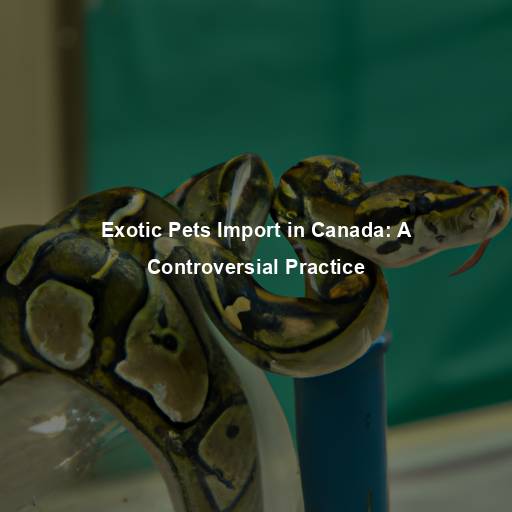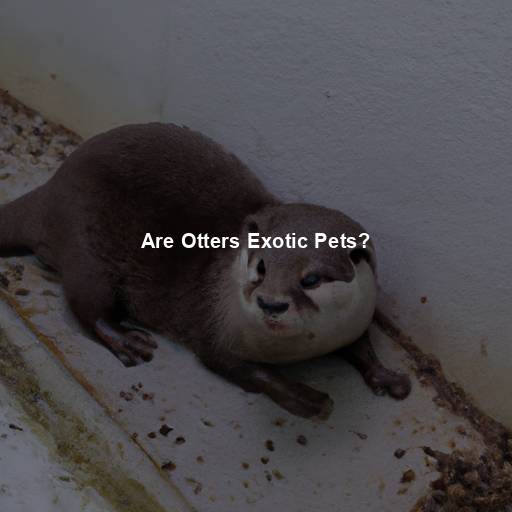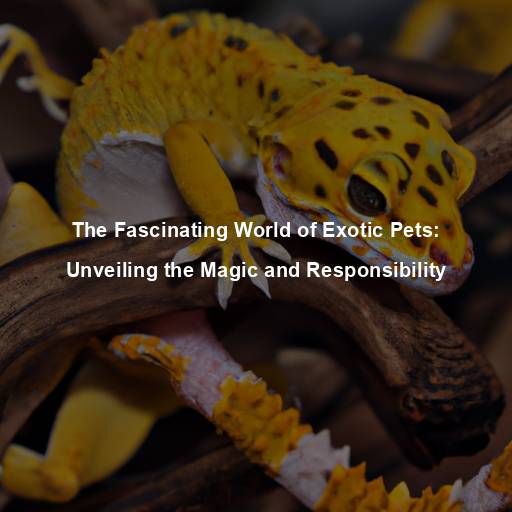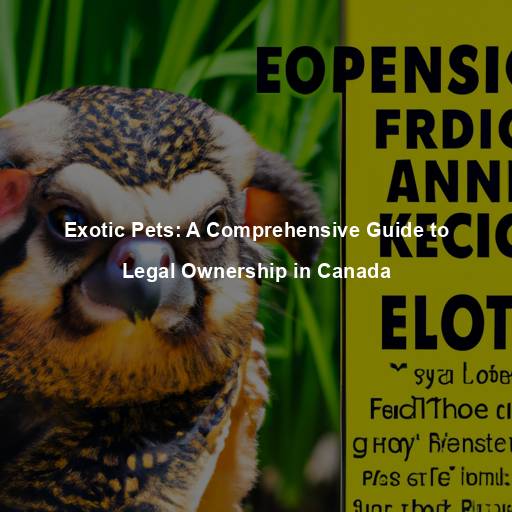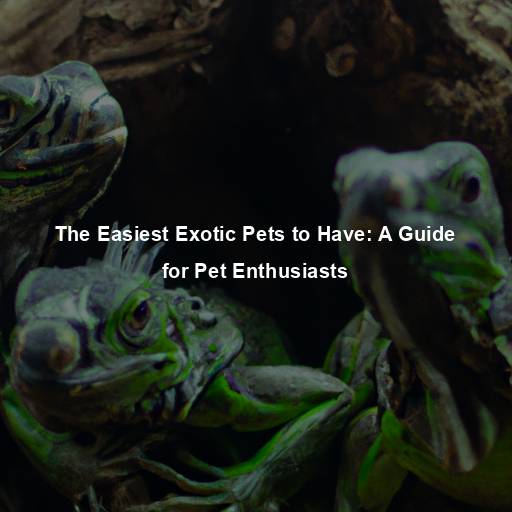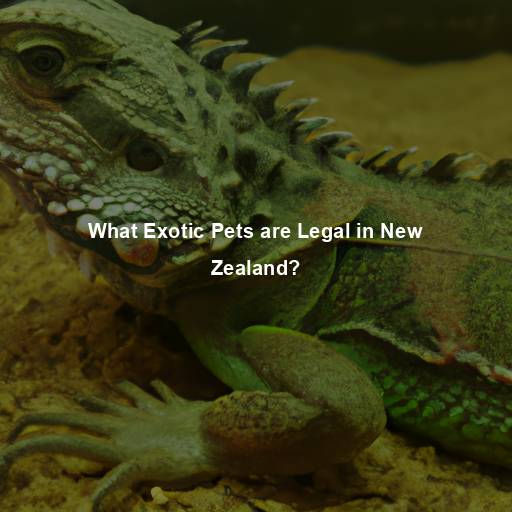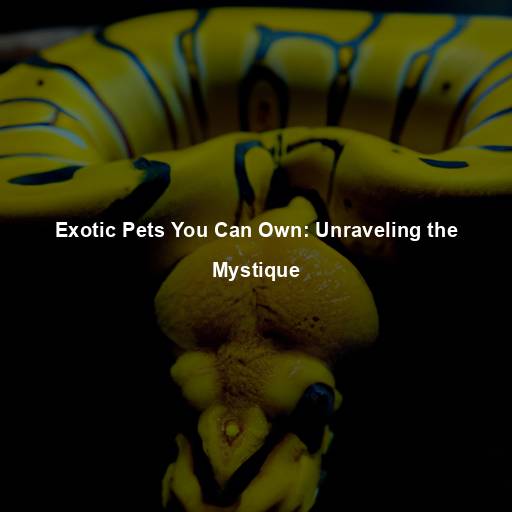Exotic Pets Import in Canada: A Controversial Practice
Last Updated on August 4, 2023 by Evan
Contents
- 1 The Fascination with Exotic Pets
- 2 The Legal Landscape of Exotic Pet Importation
- 3 Ethical Considerations: Animal Welfare and Conservation
- 4 Public Safety Concerns
- 5 The Way Forward: Balancing Passion and Responsibility
- 6 The Role of Education and Awareness
- 7 The Role of Government and Legislation
- 8 Responsible Pet Ownership: Making Informed Choices
- 9 FAQs – Exotic Pets Import Canada
- 9.1 What is considered an exotic pet in Canada?
- 9.2 Can I import an exotic pet into Canada?
- 9.3 What are the requirements for importing an exotic pet into Canada?
- 9.4 Are there any restrictions on importing certain species of exotic pets?
- 9.5 Are there any health-related regulations for bringing an exotic pet into Canada?
- 9.6 Can I bring my exotic pet with me when visiting Canada temporarily?
- 9.7 Can I release my exotic pet into the wild in Canada?
The Fascination with Exotic Pets
Exotic pets have always held a certain allure for humans. The idea of owning an animal that is out of the ordinary, something beyond the realm of traditional domesticated pets, can be enticing. From colorful reptiles to rare birds and exotic mammals, these unique creatures have captivated the imaginations of many. However, the importation of exotic pets, particularly in a country like Canada, is a hotly debated topic that raises significant ethical and environmental concerns.
The Legal Landscape of Exotic Pet Importation
Current Regulations and Restrictions
In Canada, the importation of exotic pets is governed by various federal, provincial, and territorial laws. The Canadian Food Inspection Agency (CFIA) plays a crucial role in regulating the import and movement of animals, ensuring compliance with health and safety standards. Additionally, each province and territory has its own legislation that outlines specific restrictions and requirements for owning and importing exotic pets.
The Controlled Alien Species Regulation
In Canada, the Controlled Alien Species Regulation takes center stage as a pivotal set of rules guarding against the invasion and establishment of troublesome species. Its core objective is to thwart the entry of invasive and potentially hazardous organisms into the country’s delicate ecosystems. The regulation establishes a comprehensive roster of prohibited or restricted species, spanning across reptiles, amphibians, and mammals, designed to safeguard native wildlife from the perils imposed by exotic pets. By implementing these restrictions, Canada aims to preserve the harmony of its natural world and shield it from the unforeseen havoc these alien creatures could wreak.
Ethical Considerations: Animal Welfare and Conservation
The Well-Being of Exotic Pets
The welfare of exotic pets is a major concern when it comes to their importation. Many of these animals have specialized needs that can be challenging to meet in a domestic setting. Their natural behaviors, dietary requirements, and environmental conditions may be difficult to replicate, leading to physical and psychological distress. The exotic pet trade often involves capturing animals from their natural habitats, subjecting them to stress, and disrupting their normal lives.
Threats to Conservation Efforts
The importation of exotic pets can also have adverse effects on conservation efforts. Some species coveted as exotic pets are already endangered or threatened in their native habitats. The demand for these animals fuels illegal wildlife trafficking, further endangering their populations. By supporting the importation of exotic pets, we inadvertently contribute to the decline of species and the destruction of fragile ecosystems.
Public Safety Concerns
Risks to Human Health
Exotic pets, especially those that are wild-caught, may carry diseases that can be transmitted to humans. These zoonotic diseases can pose a significant risk to public health. The close proximity between humans and exotic pets increases the chances of disease transmission, leading to potential outbreaks and public health emergencies. Furthermore, certain exotic pets, such as large reptiles or predatory mammals, may pose physical risks to their owners and others in the community.
Responsible Ownership and Education
In order to uphold the well-being of our community, it becomes paramount to cultivate a culture of responsible pet ownership and enlighten prospective exotic pet enthusiasts about the intricate web of risks and obligations that accompanies such venturesome ventures. It becomes imperative, then, to proffer them with precise and comprehensive insights into the unique needs and demands of each exotic species while underscoring the significance of adept handling, impeccable hygiene, and secure enclosures. By equipping potential owners with extensive knowledge, we envisage a future where the perils entailed in exotic pet ownership are diminished to the utmost extent.
The Way Forward: Balancing Passion and Responsibility
Enhanced Regulation and Enforcement
To mitigate the negative impacts of exotic pet importation, it is crucial to strengthen regulations and enforcement mechanisms. This includes stricter monitoring of imports, increased penalties for illegal trade, and improved coordination between federal, provincial, and territorial authorities. By ensuring compliance with existing regulations and closing loopholes, we can minimize the risks associated with the exotic pet trade.
Promoting Alternative Practices
In a world teeming with enigmatic creatures, there lies a poignant question: how can we quench our thirst for the exotic without compromising the delicate balance of nature? A resounding answer emerges from the depths of conservation, education, and responsible pet ownership. Instead of succumbing to the allure of imported pets, let us embrace the extraordinary work of zoos, wildlife sanctuaries, and educational institutions. By channeling our fascination towards these laudable alternatives, we can not only satiate our curiosity but also safeguard the well-being of our precious denizens of the wild.
Economic Considerations
The enigmatic world of exotic pets continues to captivate the minds of many, stirring a whirlwind of curiosity and fascination. This shadowy industry thrives on the delicate threads of commerce, weaving a web of financial prosperity, but at the cost of the creatures it seeks to possess. While the allure of rare and exotic pets fuels a thriving market, it casts a perplexing shadow on the welfare and conservation efforts for these extraordinary beings. Achieving harmony between the pursuit of economic interests and safeguarding the intricate tapestry of animal well-being remains an enigmatic challenge for all involved.
Social Implications
The ownership of exotic pets can have social implications as well. Some people view exotic pets as status symbols or objects of fascination, contributing to a culture that values ownership of rare or unusual animals. However, it is crucial to recognize that these animals are living beings with complex needs and should not be treated as mere accessories. Promoting responsible pet ownership and raising awareness about the ethical concerns surrounding exotic pets can help foster a more compassionate society.
The Role of Education and Awareness
Educating the Public
Raising awareness about the issues surrounding exotic pet importation is vital in shaping public opinion and driving change. Education campaigns can provide information on the risks, responsibilities, and ethical considerations involved in owning exotic pets. By fostering a better understanding of the complex needs of these animals, we can discourage impulsive purchases and promote informed decision-making.
Encouraging Conservation Efforts
Education plays a crucial role in shedding light on the value of conservation. The delicate interplay between exotic species and their natural habitats cannot be overlooked, as their extraction for the pet market can perturb the intricate ecological equilibrium. By advocating for conservation programs and uniting with organizations committed to safeguarding habitats and preserving endangered species, we can actively participate in securing the future existence of these extraordinary creatures.
The Role of Government and Legislation
Strengthening Laws and Enforcement
In the world of wildlife management, the involvement of government bodies is undeniably pivotal when it comes to overseeing the influx of unique and sometimes elusive pets. Enhancing the current laws and bolstering the mechanisms of enforcement can indeed serve as a deterrent for those who engage in unauthorized trade. A seamless collaboration between authorities, coupled with a free flow of information, will not only allow for effective regulation but will also instigate substantial penalties for offenders. By erecting a formidable legal structure, it is plausible to dissuade individuals who view exotic animals as mere commodities to be exploited for personal gain.
International Cooperation
In today’s interconnected world, it becomes evident that tackling the complex and perplexing issue of the exotic pet trade demands a burst of international collaboration. Only through the combined efforts of nations can we hope to weave an intricate web of surveillance and vigilance, tracing the enigmatic pathways of these exotic creatures. By fortifying our global bonds and exchanging the secrets of effective regulation and enforcement, we can construct an impenetrable shield against the illicit underworld of wildlife trafficking, ultimately ensuring the bewildering wonders of nature are safeguarded across the globe.
Responsible Pet Ownership: Making Informed Choices
Research and Preparation
Before considering the adoption of an exotic pet, it is crucial to conduct thorough research and understand the specific needs of the species in question. Each exotic animal has unique requirements regarding diet, habitat, socialization, and veterinary care. Prospective owners must be prepared to invest the time, resources, and commitment necessary to provide a suitable environment for their chosen pet.
Adoption and Rescue
Instead of succumbing to the allure of the exotic pet trade, there’s a more compassionate path for those yearning to own an extraordinary creature. You see, there are these incredible organizations dedicated to rehabilitating and finding new homes for exotic animals that have been abandoned or cast aside by their previous owners. By opening your heart and home to one of these resilient creatures, you not only offer them a second chance at a fulfilling life, but you also curtail the demand for wild-caught or captive-bred animals.
FAQs – Exotic Pets Import Canada
What is considered an exotic pet in Canada?
An exotic pet in Canada refers to any animal species that is not commonly kept as a pet in the country. This can include various types of reptiles, birds, mammals, and invertebrates. It is important to note that the definition of exotic pets can vary depending on provincial regulations.
Can I import an exotic pet into Canada?
Yes, it is possible to import an exotic pet into Canada. However, the importation process can be complex and subject to specific regulations. It is crucial to research and understand the requirements imposed by the Canadian Food Inspection Agency (CFIA), the Canadian Border Services Agency (CBSA), and other relevant government bodies. Additionally, certain species may be prohibited from importation due to potential risks to public health and the environment.
What are the requirements for importing an exotic pet into Canada?
Bringing home an exotic companion to Canada can be a wild journey, with a maze of regulations and province-specific peculiarities. From the strikingly exotic to the ingeniously bizarre, every species demands its own set of permits and certificates, like the CFIA import permit or an import license, for an entrance into the Great White North. Health records, proof of origin, and adherence to specific regulations might join the mix, making it a dizzying dance with bureaucracy. To soar through this perplexing process, it’s wise to consult the CFIA’s website or connect with them directly, unlocking the gate to a successful importation.
Are there any restrictions on importing certain species of exotic pets?
Did you know that there are certain rules and regulations surrounding the importation of exotic pets in Canada? It turns out that the government has put various measures in place to safeguard public health, protect native wildlife, and preserve the environment. If you’re considering bringing home a unique pet, it’s crucial to familiarize yourself with the Controlled Alien Species Regulations (CASR) list, which specifies which species are prohibited or controlled. And don’t forget to also check your provincial laws, as they may have their own specific restrictions and guidelines.
Yes, there are health-related regulations for importing an exotic pet into Canada. The CFIA requires that imported animals meet specific health standards to prevent the introduction and spread of diseases. This may include providing a health certificate issued by a certified veterinarian in the country of origin. In some cases, quarantine periods or testing for specific diseases may be necessary. It is crucial to consult with a veterinarian experienced in exotic animals and follow all health-related guidelines set by the CFIA.
Can I bring my exotic pet with me when visiting Canada temporarily?
If you are visiting Canada temporarily, it is possible to bring your exotic pet with you. However, similar to importing a pet permanently, there are specific requirements to meet. You will need to provide documentation, such as a health certificate, proof of ownership, and evidence of compliance with Canadian import regulations. It is advised to contact the CFIA and CBSA well in advance of your trip to ensure you have met all the necessary requirements.
Can I release my exotic pet into the wild in Canada?
It’s absolutely crucial to understand that there are stringent regulations in place when it comes to releasing exotic pets into the wild in Canada. The potential ramifications of introducing non-native species are far-reaching, posing significant threats to the delicate balance of our ecosystems and endangering native fauna. In situations where you find yourself unable or unwilling to provide proper care for your exotic pet, it becomes your utmost obligation to explore legal and responsible alternatives, such as entrusting authorized rescue organizations or finding responsible individuals who can provide suitable homes for these animals.

